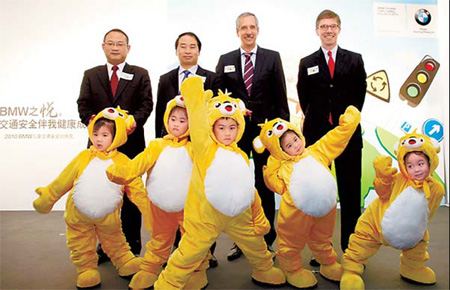BMW: Safety, environment paramount
|
|
| BMW executives and senior government officials with children at the unveiling ceremony. |
More than 200 children from 16 local kindergartens and primary schools gathered at Guozijian Museum in Beijing yesterday to participate in the unveiling of BMW's 2010 Children's Traffic Safety Education program.
"In fast-growing China, environmental protection and sustainable development have become the keywords of a healthy society," said Klaus Draeger, member of the Board of Management at BMW AG, Development.
"As a responsible corporate citizen, BMW has always been dedicated to helping China realize sustainable development in both businesses and the society."
"BMW Children's Traffic Safety Education, a crucial part of BMW China's corporate social contribution activities, has been implemented in China for six years," Draeger said.
"By spreading the concepts of harmony, safe driving and ecological protection, BMW helps create a healthy environment where children can grow safely and joyfully," he said.
The program also calls on adults and all of society to care about traffic safety, energy efficiency and environmental protection.
"We want our children to inherit a world worth living in. That is why we accept responsibility - today and in the future."
Wang Dinghua, deputy director-general of Elementary Education Department at the Ministry of Education (MOE), noted "the creative education approaches and scientific education models used by the BMW Children's Safety Education program have nurtured children's awareness of self-protection and traffic safety, and stimulated their imagination and creativity for a green world while urging every adult to seriously consider their responsibility to the earth and the future".
In collaboration with the MOE, the renowned automaker has brought safety knowledge to more than 200,000 Chinese children through its annual program.
In addition to retaining its previous simulated traffic environment, BMW's traffic safety park of this year has added vivid scenes such as a school, hospital, post office, supermarket, gas station and parking lot where children not only interact in traffic by driving toy cars or bicycles, but also learn about safety and traffic norms such as slowing down near schools or parking in the specified area.
At the post office, children can write down the memories and knowledge they gained from the camp on "Joyful Traffic Post Cards" to share with friends.
At the same time, the new "Junior Campus" program, which has proven successful in Germany, was introduced to China this year.
The program provides opportunities for children aged between 4 and 9 to learn at the safety park and also understand the importance of environmental protection through a variety of activities called Green Box, Safety Corner and Car Factory.
At the camp in Beijing, primary school students have learned through environmental protection cartoons what sustainable energy is, why water and electric power should be saved and how green traffic can be realized.
Through the role-playing game Little Environmentalist, students have discussions on environmental protection in daily life.
In the meanwhile, they try to put the theory into practice, making various car models by using recycling materials.
In children's eyes, novel cars are inventions that use new energy and equipped with energy saving engines that will make great contributions to the earth and environment, organizers said.
BMW's children safety education will expand to 20 cities this year, a record high in the program's history. Some 3,200 children from 80 primary schools and kindergartens are expected to participate in the program.
In a bid to foster traffic safety awareness in more children, BMW is also working with the MOE Elementary Education Department to publish a textbook that will be distributed to 120,000 primary school students nationwide.
The company plans to hold special charity events in Chengdu for children in the earthquake-affected areas.
 0
0 








Go to Forum >>0 Comments